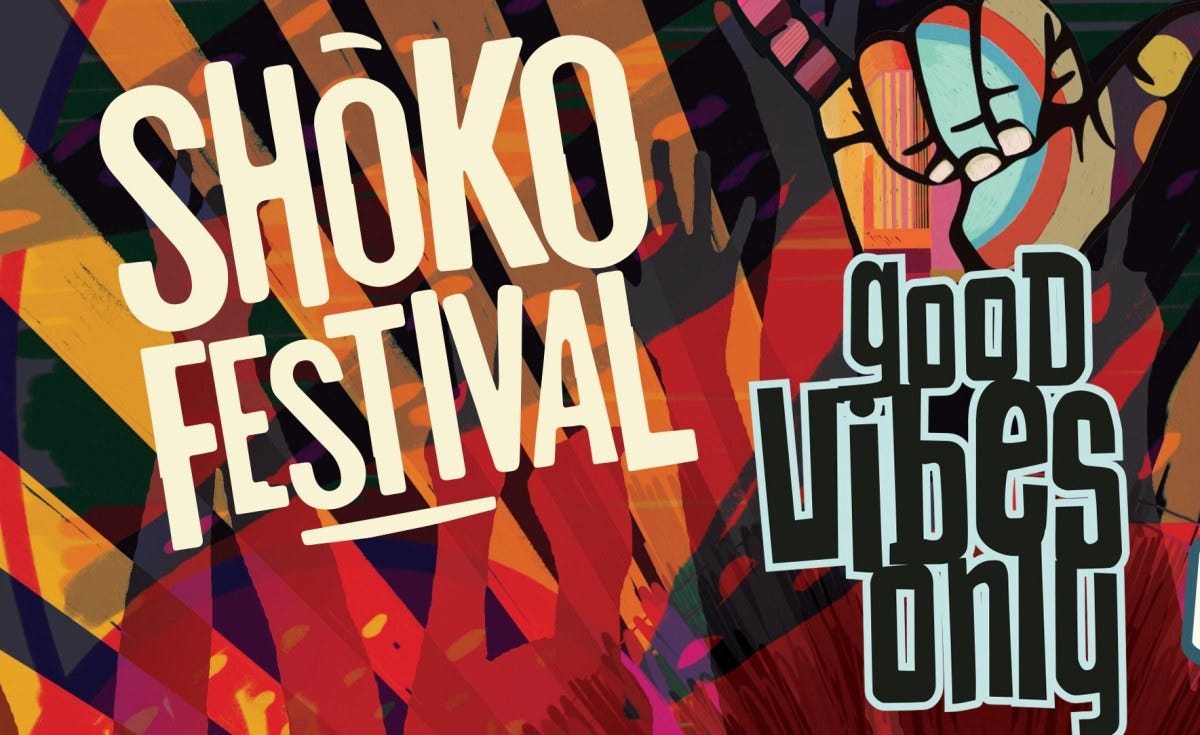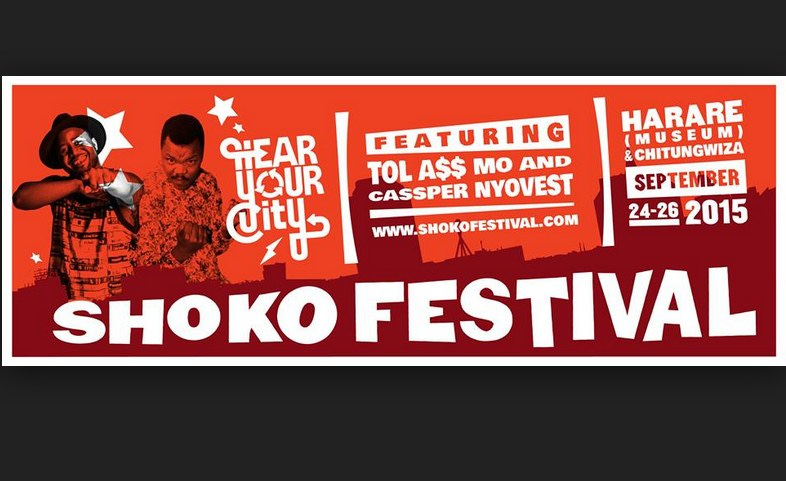I had no idea that Shoko Festival, would grow to be Zimbabwe’s biggest and longest-running urban cultural festival.
Given that it emerged from a niche hip-hop gathering, virtually what my DJ friend Ikonik Krimz calls ‘‘a banana plantation’’ (short for male dominated), into a multi-genre cultural powerhouse with inclusion of women.
The festival was first launched in September 2010 by Magamba Network, although we had been experiencing a small open mic grouping called ‘‘Mashoko’’ prior to that.
It remains trailblazing arts and activism organization co-founded by Outspoken and Comrade Fatso. I cannot name all people that initially collaborated with them as the list is long, but I remember seeing Krewkid, Wordsmith, and Upmost in the mix.
There were many others of course. I am pulling the names out of memory.
The festival was initially supported by Zim hip-hop artists, poets and up-coming comedians who would showcase their talent on what was known as ‘‘The Peoples Podium’’, from time to time some of the best would get opportunities to network with international acts, and elevate the genre's presence within the country’s music industry.
I was introduced to it by Bryan “' On Point’’ Mudarikwa when I was new in Harare. I credit him for walking me through my “' Johnso comes to town days’’.
The Roots: Mashoko and the Birth of Shoko Festival
As aforementioned , the conception of Shoko was Mashoko, a monthly spoken word and hip-hop event that took place at The Mannenberg, a renowned jazz venue in Harare.
Canvases with the words, ‘‘YOUR WORD IS YOUR WEAPON’’ would be the back drop on a wooden stage, in the dark jazzery, where you would probably passively smoke a bit of tobacco smoke from master guitarists by the end of the day. Yet you would be cool with it because the vibe was legit!
Hosted by Magamba Network, Mashoko provided a critical space for poets, emcees, and musicians to perform, engage in artistic expression, and push creative boundaries. It became a melting pot for urban culture, where rising stars like Synik, Aura the Poet, and SoProfound first gained recognition.
Yet sometimes people warned that it was risky to be in, as some of the messages by rebellious types like P.S.P (Police State Poet) - later known as Answer or Godobori would put us at risk of being dragnet arrested by state security agents (a.k.a “'The C.I.O”)
Never witnessed such an incident back them, but some stories were floating around that some people did once fall prey individually, but those are stories for other days.
During this period, the then Book Café was still located at Fife Avenue Shopping Centre, and it, too, played a vital role in fostering Zimbabwe’s spoken word and hip-hop culture. Inspired by the impact of Mashoko, the founders of Magamba Network saw an opportunity to scale up and transform the concept into a fully-fledged festival, giving birth to Shoko Festival in 2010.
Origins and Hip-Hop Roots
When Shoko Festival was launched, Zimbabwe’s hip-hop scene was struggling for mainstream recognition. The festival provided a much-needed space for emerging artists to perform, share ideas, and collaborate. The early editions were headlined by notable local rappers like Tehn Diamond, Synik, and POY, who were instrumental in shaping the country’s hip-hop movement. Internationally, Shoko Festival attracted influential acts such as Tumi and the Volume from South Africa (well that’s the brilliant Stogie T) , Akala from the UK, and Hired Gun from the US, all of whom brought global perspectives to the Zimbabwean audience.
Expansion Beyond Hip-Hop
Over time, Shoko Festival embraced a broader urban culture, extending its reach to other genres such as Zim Dancehall, R&B, Jazz, and Afro-fusion. The inclusion of dancehall artists like Winky D, Killer T, and Tocky Vibes, R&B sensations like Trevor Dongo and Tammy Moyo, and jazz musicians such as Hope Masike and Dudu Manhenga broadened its appeal. This evolution helped bridge gaps between different urban music movements, creating a truly inclusive cultural space.
Empowering Comedians and Spoken Word Artists
Shoko Festival also became a hub for spoken word artists and comedians. Through its 'Hub Unconference' and 'Bang Bang Comedy Night,' the festival provided a launchpad for comedians like Carl Joshua Ncube, Doc Vikela, Long John, and King Kandoro, who have since built international careers. The spoken word segment has featured poets such as Umind?, Madzitatiguru, and Biko, giving a voice to young, socially conscious artists who use poetry to challenge societal norms and inspire change.
Showcasing International and Local Talent
The festival’s ability to attract world-class talent has significantly contributed to its reputation. Over the years, it has featured global stars such as A.K.A (the late South Africa icon), Cassper Nyovest (South Africa), M.anifest (Ghana), Tony Rebel (Jamaica), Freshlyground (South Africa), and German rapper Blumio. These international acts have performed alongside Zimbabwean artists like Ammara Brown, Takura, Asaph, Noble Stylz, and Freeman HKD Boss. These performances have allowed local artists to share the stage with international acts, fostering collaboration and artistic growth.
A Platform for Digital Innovation and Activism
Beyond entertainment, Shoko Festival has positioned itself as a space for digital activism and creative innovation. Events such as the 'Hub Unconference' have facilitated discussions on digital media, freedom of expression, and social entrepreneurship, making the festival a critical engagement point for young creatives and activists. In recent years, it has partnered with tech innovators and civil society organizations to explore how digital tools can be used to empower young Zimbabweans.
Adapting to Challenges and the COVID-19 Era
Like many global events, Shoko Festival had to adapt during the COVID-19 pandemic. In 2020, the festival introduced an innovative hybrid model, blending virtual and in-person events. This allowed fans to tune in from across Zimbabwe and beyond, ensuring that the festival remained a key cultural event despite lockdowns and restrictions. The shift to digital programming also expanded its audience, drawing participants from different continents and creating new possibilities for engagement.
I remember seeing artists like J.Soldier and Soko Matemai making their performaces online.
Shoko Today: A Legacy of Cultural Transformation
Now in its second decade, Shoko Festival continues to grow, innovate, and adapt to the changing creative landscape. Recent editions have featured high-profile collaborations between artists from different genres and regions, ensuring that the festival remains at the cutting edge of Zimbabwean entertainment. In 2023, the festival embraced a more decentralized model, with events happening in various locations, including Chitungwiza, Harare, and beyond, bringing urban culture to new audiences.
There are also many regular programs such as Noble Stylz co-ordinated battle raps under the name, “'Bars on Bars”' which scooped an award in the 2024 edition of Zim Hip-hop Awards for it’s cultural impact. Of course Shoko Festival itself has taken numerous awards in the past decade.
Looking ahead, Shoko Festival aims to solidify its role as Zimbabwe’s premier urban culture platform by nurturing young talent, pushing digital boundaries, and amplifying voices that challenge the status quo. By providing a stage for artists across various fields, it has not only entertained but also empowered a new generation of performers, thinkers, and change-makers, ensuring that its legacy continues to grow well into the future.
Magamba Network continues to be a driving force for the next generation of artistic and cultural activists!
Much Blessings.
Born A Sage



